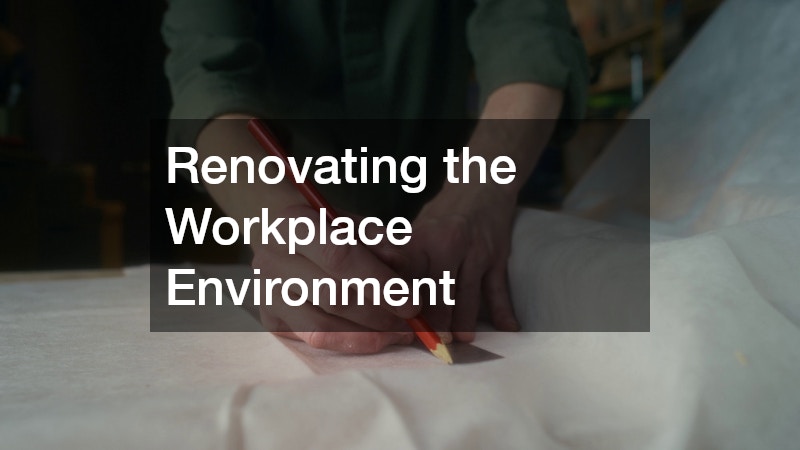In an ever-evolving, rapidly changing business landscape, business renovations have become more critical than ever. Staying adaptable, flexible, and innovative is the key to ensuring long-term success and sustainability. As we approach 2025, it is imperative that companies take a step back and evaluate how their operations, internal structures, and physical environments align with the evolving demands of the market. Companies that fail to innovate and update their systems risk being left behind in a highly competitive environment.
The Need for Continuous Adaptation
Businesses today must be proactive in adapting to changes in technology, customer expectations, and global trends. Business renovations are not limited to physical upgrades; they encompass the strategic transformations that ensure an organization remains competitive and forward-thinking.
Strategic Business Renovations for 2025
As we approach 2025, companies will need to focus on key areas such as digital transformation, sustainability, employee wellbeing, and innovation in order to maintain growth and resilience. This article will break down the most essential business renovations that can pave the way for future success in this ever-changing landscape. By embracing these renovations, businesses can stay ahead of industry trends and meet the needs of both customers and employees effectively.
Why Business Renovations Matter Now More Than Ever
The pressure to stay competitive has never been greater, and with the onset of new technologies and changing market dynamics, the need for business renovations is more urgent than ever. Renovating your business isn’t just about enhancing your physical space or processes; it’s about preparing your organization for the future. Whether you’re upgrading your technology stack, improving employee satisfaction, embracing sustainability practices, or even utilizing dumpster rental services for better waste management, every renovation decision you make has a lasting impact on the business’s ability to thrive in the years ahead.
Key Areas for Business Renovations in 2025
In 2025, business renovations will be critical for staying competitive in a rapidly evolving market. Companies must focus on a variety of areas to ensure that they remain innovative and efficient. Here are some key areas of focus for businesses looking to renovate and future-proof their operations.
Embrace Digital Transformation
Modernizing digital infrastructure is essential for future-ready organizations. By automating administrative tasks, transitioning to cloud computing, adopting AI tools for business intelligence, upgrading outdated software, and enhancing cybersecurity protocols, businesses can stay competitive and efficient. Digital transformation is not just about technology—it’s about adapting to new ways of doing business.
Focus on Sustainability and Green Practices
Environmental responsibility is no longer optional. Businesses that prioritize sustainability will not only save costs but also appeal to environmentally-conscious consumers. Key strategies include switching to energy-efficient systems, using eco-friendly materials, installing solar panels or renewable alternatives, implementing recycling programs, and promoting sustainability in supply chains. These actions will help businesses thrive while reducing their carbon footprint.
Integrate Remote Work Solutions
Flexible work models are becoming standard in the modern workplace. To keep up with this shift, businesses should focus on integrating remote work solutions. Providing remote collaboration tools, training staff on virtual communication, creating hybrid work policies, securing remote access systems, and tracking productivity with digital tools are essential steps in making remote work a successful and seamless part of business operations. In some industries, adapting to this new model may also involve heavy equipment rental to support off-site or mobile teams and ensure operations continue smoothly regardless of location.
Leverage AI and Automation
Staying competitive through intelligent systems is critical. Businesses should introduce chatbots for customer service, use AI in data analysis, automate inventory and logistics, adopt machine learning for marketing, and integrate smart sensors in operations. These technologies will streamline processes, reduce costs, and improve decision-making across the organization.
Renovating the Workplace Environment

Renovating the workplace environment is an essential part of creating a productive and engaging space for employees. The right environment not only boosts employee morale but also enhances collaboration and innovation.
Enhance Office Layout and Design
A well-designed office space can improve both morale and efficiency. By redesigning spaces for collaboration and flexibility, adding wellness-focused areas, using modular furniture, improving lighting and ventilation, integrating quiet zones for focused work, and refreshing the building’s exterior painting, businesses can create a dynamic and comfortable work environment that enhances productivity, job satisfaction, and curb appeal.
Improve Physical Security Systems
Security is foundational to trust, both internally and externally. Upgrading surveillance systems, working with a business security partner, implementing keycard or biometric entry, training staff in emergency procedures, and securing data centers physically are essential steps in ensuring the safety of both employees and company assets.
Upgrade Building Infrastructure
Structural improvements are crucial for ensuring long-term value and operational efficiency. Replacing outdated HVAC systems, inspecting plumbing and wiring, partnering with building supply vendors, installing high-performance windows and insulation, and working with heavy equipment rentals for large-scale projects will help improve the overall functionality and durability of business premises.
Consider Exterior Renovations
First impressions matter, especially in business. Exterior renovations can significantly impact client perception and the overall aesthetics of the company. Scheduling exterior painting updates, repairing facades and signage, refreshing landscaping and outdoor lighting, replacing or renovating roofing, and maintaining parking lots and accessibility will help create a welcoming and professional appearance for clients and visitors.
Essential Service-Based Business Renovations

For service-based businesses, renovations extend beyond physical spaces to include operational improvements and customer service enhancements. These steps will ensure better efficiency and customer satisfaction.
Upgrade Facility Utilities
Upgrading heating, ventilation, and air conditioning (HVAC) systems, inspecting electrical systems, automating energy controls, monitoring water usage, installing smart thermostats, and working with a commercial locksmith service to enhance physical security can significantly reduce operational costs while improving the comfort and safety of employees and customers.
Modernize Communication Tools
Effective communication is essential for collaboration and smooth operations. Businesses should adopt VoIP phone systems, integrate messaging platforms, use video conferencing tools, connect CRM systems, and offer virtual customer support to enhance both internal and external communication.
Optimize Equipment and Maintenance
Streamlining operations through technology and regular maintenance ensures the smooth running of business processes. Using predictive maintenance software, partnering with commercial locksmith service experts, replacing old fixtures and devices, setting maintenance schedules, and utilizing dumpster rental services for cleanouts will help keep operations running efficiently.
Invest in Repairs and Emergency Services
Unexpected issues can disrupt business operations. By finding a reliable phone repair company, creating an emergency repair protocol, a list of building supply, training staff in maintenance basics, and budgeting for emergency repairs, businesses can ensure they are prepared for unforeseen challenges.
Strategic Business Renovations for Growth

For businesses to sustain long-term growth, strategic renovations must be implemented in several key areas, including insurance coverage, customer experience, and employee development. These steps will help businesses secure their future success.
Reevaluate Business Insurance Coverage
Protecting assets and personnel is vital for business longevity. Businesses should compare policies annually, consult with business insurance experts, assess risk management plans, include cyber liability coverage, and review worker’s compensation policies to ensure that they are adequately protected against various risks.
Work with Specialized Suppliers
For quality materials and support, businesses should build relationships with specialized suppliers. By sourcing materials from glass suppliers, local vendors, and ensuring material sustainability, businesses can streamline their supply chains, improve reliability, and save costs.
Modernize Customer Experience
Creating a memorable and seamless customer experience is key to building loyalty. Businesses should create mobile-friendly platforms, offer contactless service options, improve website speed and accessibility, provide personalized content, and implement loyalty programs and feedback loops to keep customers satisfied and engaged.
Support Employee Development
Engaged employees are productive employees. Businesses should offer training programs, set clear growth paths, introduce mentorship initiatives, provide tools for remote learning, and recognize achievements regularly to foster a culture of continuous improvement and growth.
Financial Considerations of Business Renovations
When undertaking business renovations, it’s crucial to manage finances carefully to ensure that the investments lead to long-term benefits—including reviewing your business insurance to make sure your updated operations are fully protected.
Budget Smartly for Renovation Projects
Proper planning and budgeting minimize disruptions and ensure that renovation projects stay on track. Estimating costs upfront, securing necessary permits, allocating emergency funds, working with experienced contractors, and prioritizing high-impact areas will help businesses manage their renovation projects effectively.
Understand Renovation ROI
Evaluating renovation ROI (Return on Investment) is essential for businesses looking to ensure that their business renovations are contributing to long-term success. Measuring the long-term value of renovations requires tracking key performance indicators (KPIs), such as productivity improvements, energy cost savings, brand enhancement, employee retention rates, and revenue impact. Collaborating with business suppliers can also streamline procurement and implementation processes, helping companies achieve cost-effective improvements. These metrics give companies a clear understanding of how their renovations are supporting growth, sustainability, and profitability.
Seek Funding and Incentives
Funding is available for business renovations through various channels. These funding options help make renovations more financially viable while supporting eco-friendly and sustainable initiatives. It’s also an ideal time to invest in business security including surveillance systems, access control, and cybersecurity upgrades—to protect your newly renovated space and digital infrastructure.
Performance Evaluation and Adjustment
To maintain momentum, regularly evaluating performance helps companies identify areas for further improvement and make data-driven adjustments. This ensures that renovations are always aligned with the business’s strategic goals and are effectively contributing to growth and innovation.
Why Business Renovations Matter More Than Ever

In 2025, business renovations are more than just cosmetic updates—they are essential strategies for future-proofing a company’s operations. These updates go beyond visual enhancements; they are crucial changes that align with a company’s goals for growth , sustainability , and technological advancements . Renovating your business infrastructure and processes is no longer optional; it’s necessary to maintain a competitive edge and meet customer expectations.
Aligning Renovations with Strategic Goals
By aligning business renovations with broader organizational goals, companies can ensure that each renovation contributes directly to their long-term vision. Whether upgrading digital systems, improving physical layouts, or enhancing security measures, these renovations are investments in the company’s future.
Building a Resilient Future Through Business Renovations
Every renovation decision, whether focused on digital systems , security protocols , or sustainable practices , plays a crucial role in building a resilient business for the future. These strategic renovations help companies improve internal processes, reduce risks, and build a strong foundation for growth in an evolving marketplace.
Strategic Renovations for Long-Term Success
By consistently making thoughtful updates to their operations, businesses can ensure that they are prepared for future challenges and can capitalize on new opportunities. Investing in renovations that enhance resilience enables companies to thrive no matter what changes the future holds.
Business Renovations as a Strategic Investment
Business renovations are not merely maintenance projects; they are strategic investments in a company’s infrastructure, culture, and people. By viewing renovations as a long-term commitment, businesses can align each renovation with broader organizational goals. This approach positions companies to thrive in changing markets and meet shifting customer expectations.
Making Smart Choices With Business Renovations
To maximize the effectiveness of business renovations , it’s important to prioritize innovation . By tracking the impact of renovations, gathering feedback from employees and customers, and collaborating with industry professionals in areas such as construction, IT, and sustainability, businesses can ensure their renovations are impactful over the long term.
Prioritizing Long-Term Success
Smart business owners should focus on strategic decisions that have lasting benefits. This includes selecting the right renovation projects, ensuring sustainability in their choices, and collaborating with experts to achieve the best results. With the right approach, business renovations will contribute to long-term success.
Renovating for a Stronger Future
Renovations such as enhancing digital systems, optimizing office layouts, and adopting sustainable practices contribute to strengthening a company’s foundation. These updates enable businesses to meet the evolving needs of their customers and stay on top of technological advancements. As industries evolve, businesses must ensure that their operations evolve with them. Whether it’s upgrading heating systems with a heating repair service or improving digital infrastructures, every renovation plays a crucial role in business sustainability.
Building for the Future with Strategic Renovations
By continuously updating their operations, businesses can stay relevant and maintain a competitive edge. Each business renovation contributes to long-term growth, positioning companies for success in a rapidly changing business environment.
Transformation as the Key to Thriving
Transformation is the key to thriving in the future. Business renovations are not just a one-time event; they are a continuous journey toward growth, resilience, and innovation. Companies that embrace ongoing change and improvement will be prepared for the next phase of their journey, remaining agile and adaptable in the face of future challenges.
Continuously Evolving for Long-Term Success
Ultimately, business renovations are not a single event but a continuous process that ensures companies are future-proofing their operations. This ongoing commitment to renovation lays the groundwork for long-term success and helps companies adapt to future challenges. By embracing continuous improvements and evolving with the times, businesses will remain competitive and resilient in an ever-changing market.

